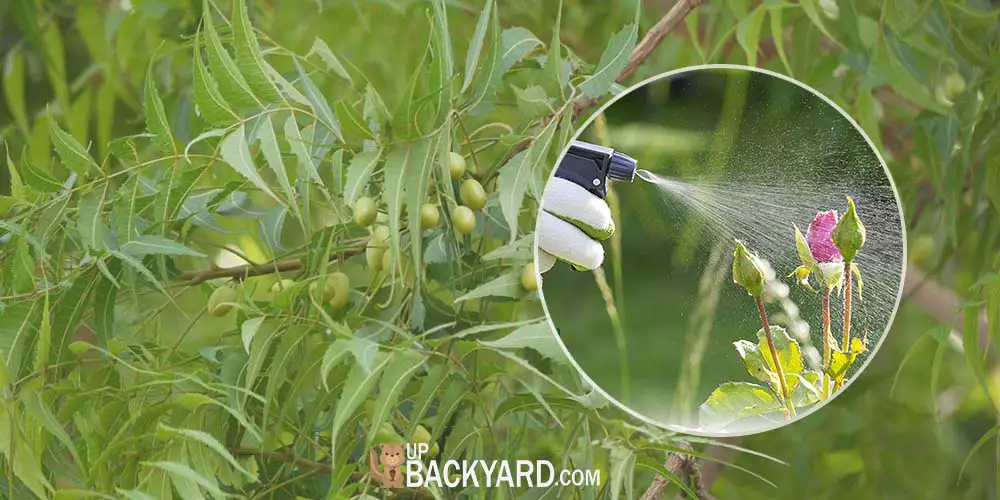With an increase in interest in backyard gardening, many gardeners both new and experienced are looking for organic solutions to help ward off pests from their crops.
If you have been in the gardening loop searching for answers, you may have come across neem oil.
Neem oil is taking the entire organic gardening community by storm thanks to its effectiveness without harsh or toxic chemicals.
But can you consume neem oil?
Can You Eat Vegetables That Were Sprayed With Neem Oil?
Yes, neem oil in the amounts that you would use to spray your garden vegetables is non-toxic to humans. Do not spray neem oil on vegetables within a few days of when you plan to harvest them. Even so, it is best to wash your vegetables thoroughly before consumption.
What Is Neem Oil?
Neem oil is everywhere on gardening blogs and websites these days, but what is it?
This oil is actually made from the seeds of tropical neem trees. These seeds are pressed into an oil and used as a natural pesticide and have been used in this manner for thousands of years.
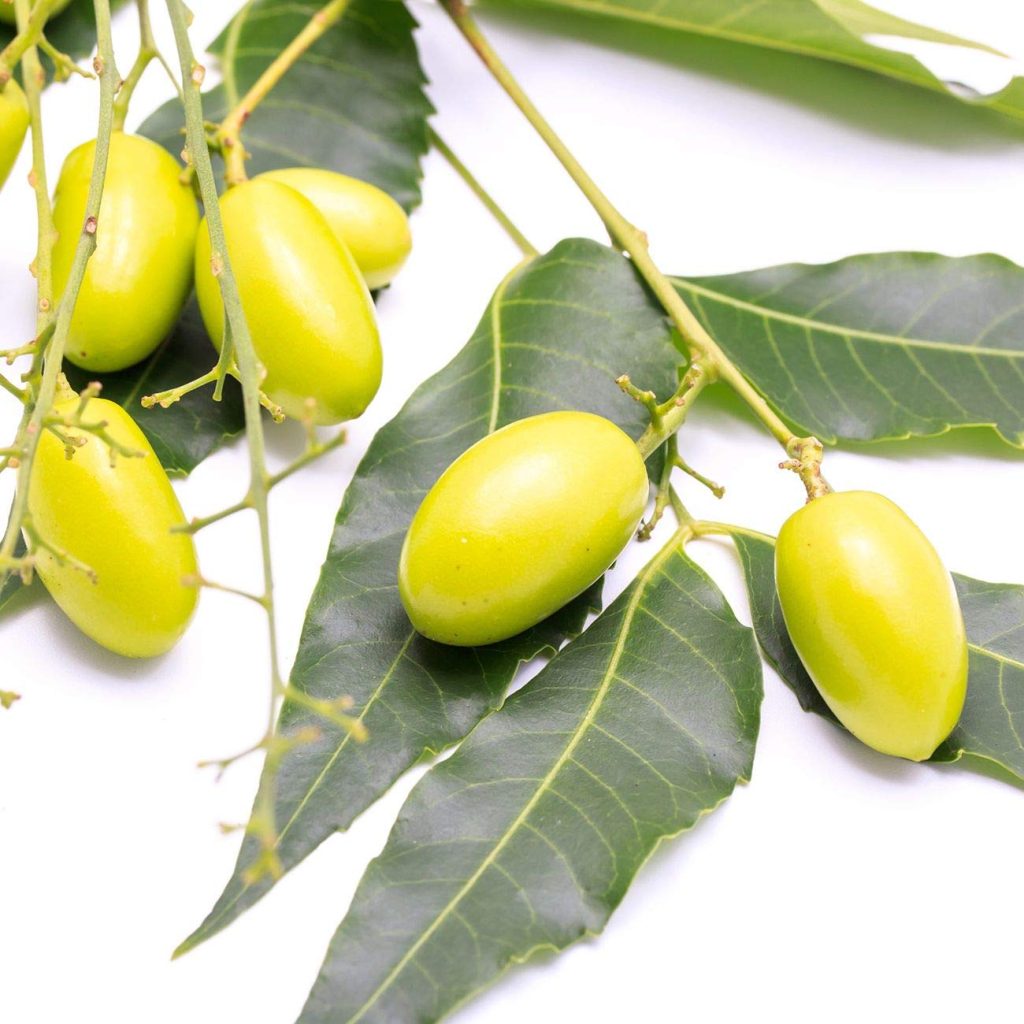
Neem oil is yellowish brown in color and can have a pungent smell. It is not uncommon for your neem oil to smell a bit like sulfur. While the smell can be off putting at first, it will fade as the oil dries.
There are two ways of applying neem oil to your garden. The first way is to saturate the soil around your plants. Neem oil does not harm the soil or other plants in the area.
The other way of applying neem oil is by spraying it directly on the plants. This seems to be the most effective way at preventing bugs and other predators from eating your garden crops.
Is Neem Oil Safe?
Neem oil, like almost everything, can be toxic if ingested in large quantities.
Children, pregnant women, and women who are nursing are at a higher risk of developing a reaction to neem oil. Ingesting neem oil at a toxic level can result in seizures, kidney failures, and other medical issues.
It is incredibly unlikely to come in contact with or ingest a toxic amount of neem oil. Since this is a naturally occurring oil, once it is processed it is recognized as food within the body.
There is no need to worry about your furry friends either. Spraying neem oil in your garden is not toxic to dogs or cats.
Be sure to keep your large quantities of neem oil away from pets or other animals.
Although they would most likely be deterred from consuming the oil because of the smell, in large amounts, neem oil can result in seizures, an overproduction of saliva, and other medical problems.
How Long After Spraying Neem Oil Is It Safe To Eat Vegetables?
Although neem oil is an effective and efficient natural pesticide, it may require more than one application throughout the season.
Neem oil sprayed directly onto plants in your garden will wash off in the season’s rain, leaving the plant susceptible to pests again.
It’s not uncommon to have to reapply your neem oil solution at least twice during the summer.
You can apply it as frequently as you see fit since it is a natural and organic solution that does not harm the soil, plants, or surrounding nature.
If you plan on harvesting and consuming your garden’s crop soon, it is best to avoid using the neem oil for about a week before the intended harvest.
Sometimes, you will have to choose which vegetables to use the neem oil on and leave the others without if you have a split harvest or if some plants are coming into their ripened stage at a different time than the others.
In this case, it is still safe to use the neem oil on other surrounding plants, but avoiding the plants you will be harvesting. Even the unsprayed plants will enjoy the benefits of the neem oil being in the same proximity as the treated plants.
Even if you have only applied neem oil once or it has been a while since the last application, it is important to thoroughly wash the vegetables before consuming them.
This is necessary for a variety of reasons outside of the possibility of neem oil residue, including insect eggs, animal waste, and other things the vegetables may have come in contact with.
You can soak your vegetables in a sink filled with Lukewarm water mixed with a few tablespoons of vinegar. This will help remove any germs, dirt, or residue from the vegetables.
Allow the vegetables to soak for about 20 minutes. After they have soaked, be sure to rinse them well under cool running water.
This will help remove any of the residue or dirt still on the vegetable. After they have been rinsed, place them on a paper towel to dry on your counters.
Be sure the vegetables have dried completely before storing them to avoid moisture-related issues. Mold and mildew can grow easily in damp conditions and destroy all your hard work very quickly.
What Else Can I Use Neem Oil For?
So we know that neem oil makes a perfect natural pesticide for your garden space, but what else can you use neem oil for?
While it may seem counterintuitive to use a solution that is known for its pesticide properties on yourself, neem oil can be incorporated into your beauty and hygiene routines.
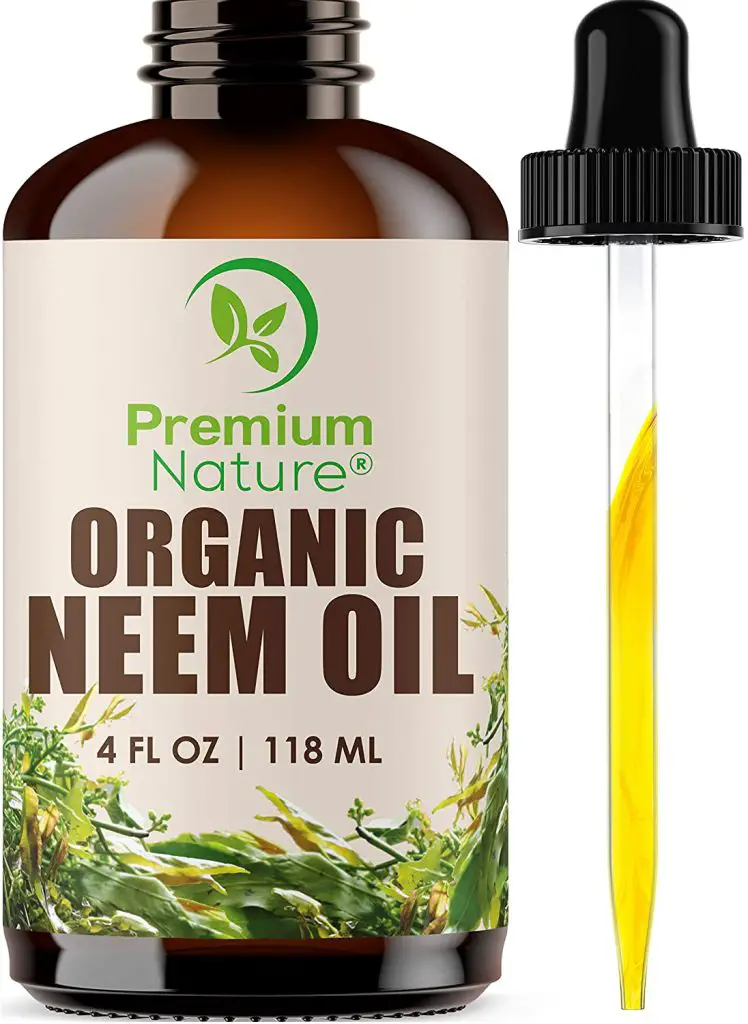
Some people have used neem oil for skin problems like eczema or psoriasis. Other uses for neem oil topically include treating acne, lessening and preventing wrinkles, reducing scars, and even helping to heal wounds.
Many of the properties found in neem oil promote health in the skin and hair tissues of humans. Thanks to its fatty acid compounds and vitamin E contents, neem oil is a great addition to anyone’s skincare routine in moderation.
It is best to use neem oil that has been mixed with a carrier oil, like coconut or avocado oil, to reduce the chance of an irritation occurring.
Neem oil alone can be quite potent. Depending on what you are attempting to treat, adding more or less of a carrier oil would be appropriate.
Neem oil can also be used to treat warts. This application of neem oil would be considered a spot treatment.
Warts can go very deep into the skin and in order for the neem oil to penetrate deep enough, a stronger solution of neem oil may be necessary.
Choosing high quality neem oil is also as important as the amount you put on your body.
Be wary when buying products online as it can be easy to be sold an inferior product from a place that may not have as high of standards and regulations as the United States.
What Are Some Natural Alternatives to Pesticides?
Perhaps neem oil with all its perks just is not for you or your garden space.
What else can you use as a natural alternative to pesticides?
Luckily, there are many ways that you can deter pests from eating your garden without using harsh chemicals or drastic measures.
We have to think of the impact what we use in our gardens has on the world around us.
We are not the only ones who enjoy the beauty of a garden. Bees, butterflies, birds, insects, and more all rely on the plants in our gardens to grow, thrive, and survive.
Strong chemical sprays may keep the bad and unwanted insects away, but may also harm the “good” ones we want to encourage.
Flowers contain pollen and nectar which is the main food source for pollinators like bees and butterflies. Making sure that whatever we use in our gardens do not harm them is vital.
Without pollinators, our flowers would not get pollinated as efficiently. This means that no seeds or fruit would be borne from flowers on plants that are not self-pollinating. Almost all the fruit and vegetables that humans consume are pollinated by different pollinators.
So what can you do to not harm these beneficial insects but still protect your plants from the ones who will destroy them?
The first line of organic defense is by planting companion plants that will ward off other pests.
A companion plant is any plant that is grown near another to benefit the plant. Marigolds have been known to feed pollinators while warding off nematodes that can harm plants.
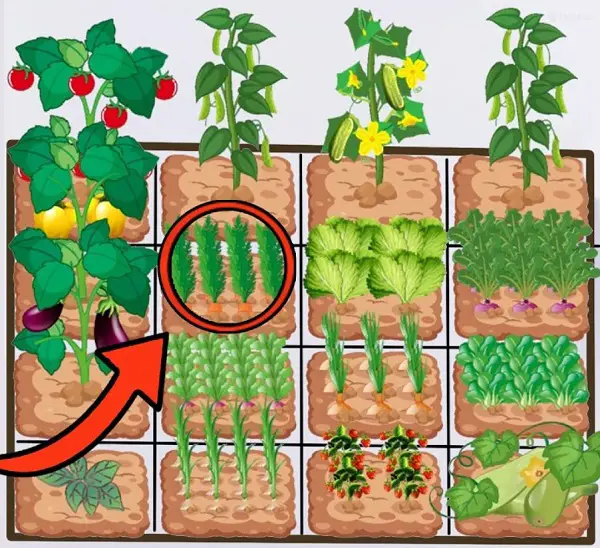
Strong smelling herbs like dill and thyme also make a great choice in keeping pests away.
Choosing to not use harsh chemicals does not mean that you cannot use “soft chemicals”.
Soft chemicals are common household products like dish soap and vinegar that can be sprayed on and near plants that do not harm them or the environment but still make the area displeasing to pests and predators.
Releasing or encouraging beneficial insects that eat pests is a great way to increase the good insect population in your garden.
Lacewings help pollinate plants when they are adults, but when they are larvae, they eat aphids. Aphids are small bugs that easily and quickly destroy crops and flowers.
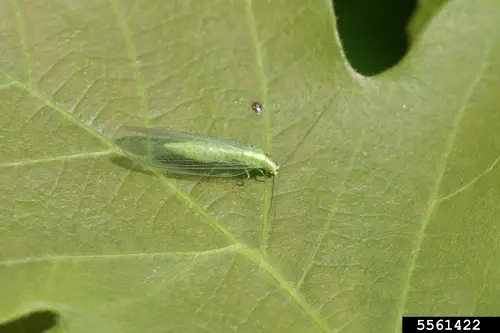
Encouraging a lacewing population immediately lowers the aphid population in your garden and helps protect your plants from damage. Lacewings do not bite or sting humans, so it is safe to have a large population of them in your garden.
Final Thoughts
Neem oil makes a great alternative to harsh chemical sprays when you are looking for ways to protect your garden from pests. Neem oil is safe and nontoxic to humans in the amounts that are commonly used for pest control in gardens.
Not only is neem oil organic and safe for humans, it is also safe to use around other animals like cats and dogs.
Even if they eat a vegetable or fruit that was recently treated with neem oil, they will be fine. Children, pregnant women, and women who are nursing should be slightly more cautious with neem oil.
If you are getting ready to harvest your produce, it is best to allow at least a week to pass from the time you last sprayed with neem oil and the time you plan to eat your crop.
You should always rinse and wash your produce well before consuming regardless of when it was last treated with neem oil.
Neem oil also has other health benefits. It can be used to treat acne, skin conditions, fight wrinkles, and minimize warts.
When using neem oil topically, be sure to mix the oil with a carrier oil like coconut or avocado oil to avoid skin irritation.
While neem oil is a versatile and effective pesticide, you may be interested in other natural pesticides for your garden.
Growing companion plants, using “soft chemicals” like soap or vinegar, or encouraging a lacewing population in your garden can all be effective and chemical-free solutions to your pest problem.
Happy Gardening!
